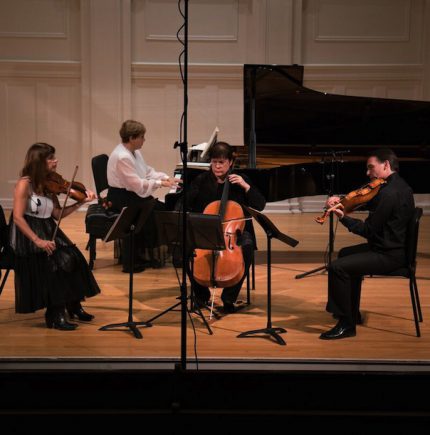Orion Ensemble leads off season in genial fashion

The Orion Ensemble opened its 24th season with a genial and satisfying program of chamber works by three composers with widely differing musical outlooks.
The program, which took place Sunday night at the Music Institute of Chicago in Evanston, opened and closed with two works of Mozart– both sunny of temperament but differing in scale and seriousness of intent.
It doesn’t often happen that composers are enlisted to bail out fellow artists, but the composer’s two duos for violin and viola did precisely that. Mozart’s friend Michael Haydn (brother of Joseph) was too ill to fulfill a commission for six duos by his boss, the Archbishop Colloredo, so Mozart stepped in to complete the final two works. With the master’s characteristic insistence on a viola part on equal footing with the violin, it’s hard to believe that Haydn’s employer wasn’t suspicious.
String duos of this era tend to be less ambitious than other genres of chamber music, and for all of it’s melodic riches and clever voicing, his Duo in B flat isn’t quite top-drawer Mozart. But violinist Florentina Ramniceanu and guest violist Stephen Boe made a strong case with a reading that mined the work’s lyrical charm and made easy work of even the toughest passages. The warm acoustic of Nichols Hall was flattering to their sound, though balances were occasionally a bit bottom heavy.
The Piano Quartet in E flat Major comes with its own interesting backstory—a plea from Mozart’s publisher to lighten up after his G minor quartet was seen as too gloomy and difficult for the amateur musicians who were his primary customers. Though Mozart was released from his contract to complete a set of three works, the composer wrote this second opus, a sunnier work but no less a masterpiece than the first.
While nominally chamber music, Mozart’s piano trios and quartets share much of their DNA with his piano concertos. Pianist Diane Schmück rose to the occasion with a probing and light-fingered account, though the hall’s quirky acoustics (less forgiving for piano than for strings and woodwinds) tended to cast the keyboard with distant and diffuse shadings that muddied the middle and lower registers. Boe, Ramniceanu, and cellist Judy Stone teased out the singing lines of the middle slow movement and brought a charming lilt to the finale.
Alexander Zemlinsky is known to most audiences from program note references as Schoenberg’s only composition teacher, eventual father-in-law, and champion of the symphonies of Mahler. His Op. 3 Clarinet Trio received high praise from Brahms, and Orion’s gritty, compelling reading of this brooding score provided ample justification for the elder composer’s accolades. Clarinetist Kathryne Pirtle rose to the occasion with a burnished sound that effortlessly filled the hall with Zemlinsky’s passionate entreaties. Even with the composer’s penchant for overheated rhetoric, Stone and Schmück found the allure in the trio’s many intimate pages.
The Orion Ensemble has commissioned many scores over the years, one of the earlier examples being The Pontoon-Bridge Miracle by Oklahoma-based James Wintle. Inspired by a poem by Vachel Lindsey, the score depicts a journey down Chicago’s Michigan Avenue with ghosts from its colorful past, including a procession of P.T. Barnum’s circus animals.
Wintle’s musical language is academic neo-classicism, with nods to Stravinsky and Prokofiev, and enough recognizable aural illusions to hold the listeners’ attention. The trio’s affection for the work was palpable, and even with an ending that was a bit too pat, the journey largely succeeded on its own terms.
The program will be repeated 7:30 p.m. Wednesday at PianoForte Studios in Chicago. orionensemble.org
Posted in Uncategorized


